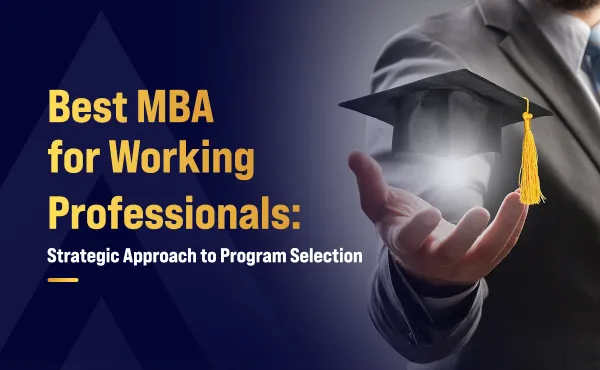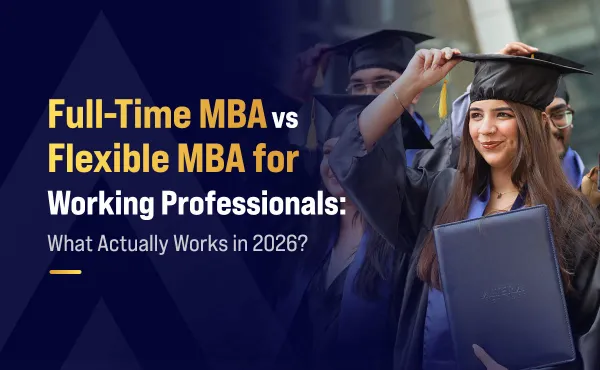Which MBA is Best for Working Professionals?

The best MBA for working professionals depends on multiple factors but most primarily on work experience. Professionals with 1-3 years of experience should pursue a full-time MBA that offers immediate career advancement, while those with 5+ years will benefit most from Executive MBA programs that offer strategic leadership skills and substantial salary hikes.
For working professionals in India aiming to upskill, lead with impact, or pivot career paths without quitting their jobs, choosing the right MBA program is critical. Hence, to make a more informed decision, this article explores the latest data and insights to help working professionals decide which MBA format is best suited for their career.
Key Statistics That Define MBA Success for Working Professionals
The MBA landscape for working professionals in India has evolved dramatically, with data revealing compelling trends that should guide your decision:
- Employability among MBA graduates in India has risen sharply to 78% in 2025.
- On average, professionals who complete an MBA in India experience a 50% to 100% boost in their earnings compared to their salaries before obtaining the degree.
- 75% of Executive MBA graduates report promotions within 6 months of program completion.
- Executive MBA market in India is projected to grow to ₹2,090 crores by 2029.
- Nearly 95 universities throughout India collectively deliver over 500 online MBA programs that are approved by the UGC.
These figures show that pursuing an MBA in India is a high-return investment for working professionals, which helps boost their employability and earnings, accelerate promotions, and align with a rapidly expanding executive and online education market.
Types of MBA programs Available for Working Professionals
The Indian MBA ecosystem has matured significantly, offering multiple pathways tailored to different career stages and professional goals. Being aware of these different educational pathways is essential to optimize your investment in higher education.
1) Full-time MBAs
Full-time MBA programs represent the traditional, intensive two-year residential management education experience. These programs provide comprehensive business education through immersive learning, extensive case studies, internships, and robust networking opportunities.
Accreditation:
- Universities must be recognized by the University Grants Commission (UGC) to offer legitimate MBA programs in India, making UGC accreditation mandatory for such degrees.
- The National Assessment and Accreditation Council (NAAC) provides institutional quality grades to universities, such as A++, A+, A, B, C.
- The National Board of Accreditation (NBA) accredits programs at the subject level.
A full-time MBA from a highly accredited institution carries strong global recognition. Graduates are well placed for opportunities across sectors, can pursue doctoral studies abroad, and are highly considered for roles in international consulting and finance firms.
Key Benefits:
Full-time MBA programs deliver several distinct advantages:
- Comprehensive Business Foundation: Students gain structured exposure to core management disciplines, allowing them to build a strong and balanced base.
- Career Transformation: The program is ideal for professionals seeking to switch industries or move into senior management roles.
- Premium Placement Opportunities: Tier-1 institutes in India attract top recruiters from consulting, investment banking, technology, and global corporations who actively hire from leading campuses.
- International Exposure: Many programs include student exchange options, global immersion modules, and participation in international case competitions.
- Extensive Alumni Network: The residential experience fosters lifelong professional relationships and access to accomplished alumni across sectors.
2) Executive MBA (EMBA)
Executive MBA courses target mid- to senior-level professionals who already possess considerable industry experience. These programs balance advanced management education with continued professional responsibilities through weekend, evening, or modular formats. The curriculum focuses on strategic thinking, leadership, and cross-functional decision making so that lessons can be applied immediately in the workplace.
Accreditation:
- AICTE approval for autonomous institutions offering EMBA programs.
- UGC recognition for university-affiliated Executive MBA degrees.
- AACSB accreditation for premier programs (IIM Ahmedabad, IIM Bangalore, IIM Calcutta, ISB).
- AMBA accreditation for select international standard programs.
Key Benefits:
Executive MBA programs deliver several distinctive advantages for experienced professionals:
- Immediate Application of Learning: Participants can put newly learned frameworks and tools to work in their current roles, creating business impact during the program.
- Peer Learning: Classroom discussions are enriched by cohorts of seasoned professionals, with typical peer experience averaging around 10 years.
- Accelerated Career Growth: Around 75 percent of EMBA graduates report receiving promotions within six months of program completion.
- Flexible learning: The program structure allows professionals to balance study with ongoing work commitments.
- Preparation for C-Suite Roles: The curriculum emphasizes strategic leadership, governance, and the competencies needed for top executive roles.
3) Part-time MBA
Part-time MBA programs deliver flexible management education tailored to working professionals. Classes are typically conducted in a blended format leveraging online, evening, and weekend classes, based on different institutes. Many programs stretch over three to five years, so learners can progress at a steady pace, which leads to structured skill development while choosing to continue full-time employment.
Accreditation:
- AICTE approval is mandatory for all part-time MBA programs.
- UGC recognition is vital for university-affiliated institutions.
- NBA accreditation is available for quality-assured programs.
- State university affiliations for regional institutions.
Part-time MBAs from established institutions carry equivalent professional value to full-time programs; however, institutional reputation matters significantly. Many colleges in India also offer part-time executive MBAs in India, specifically catering to working professionals, for example ISB’s PGP PRO is a part-time executive MBA.
Key Benefits:
- Maximum Flexibility: Evening and weekend timetables let professionals continue full-time work while studying.
- Continuous Income: Participants maintain their salary stream and avoid taking a career break.
- Gradual Learning Integration: A longer program timeline enables learners to absorb concepts, apply them on the job, and iterate over time.
- Cost Effective: Part-time tuition is generally lower, commonly in the range of ₹6 to ₹16 lakhs, compared to an average of ₹30 lakhs for many full-time private MBA programs.
4) Industry-Focused PGPs
Industry-focused Post Graduate Programs (PGPs) are specialized one-to-two-year intensive programs designed to provide deep expertise in specific sectors or business functions. These programs are most popularly offered by IIMs and select premier institutions, targeting experienced professionals seeking rapid specialization in a core area during the program's duration.
Accreditation:
- AICTE approval for autonomous institutions.
- IIM brand recognition provides global credibility.
- Industry partnerships with sector leaders for curriculum validation.
- International rankings - for example, IIM Indore’s EPGP is ranked #69 globally in FT Rankings 2025.
Industry-focused PGPs are highly regarded by employers because they target the exact skills companies need. Their specialized curriculum aligns closely with current industry requirements, and their faculty is composed of both academic experts and experienced professionals. These elements make graduates attractive for roles that demand immediate domain competence and experience.
Key Benefits:
- Rapid Specialization: PGPs often leverage an Intensive one-year format for quick skill acquisition in a particular specialization.
- Industry Relevance: Such courses frequently update their curriculum to match current market demands and standards.
- Practical Application: Real-world case studies and live industry projects help develop job-ready experience for its students.
- Expert Faculty: The combination of academic professors and industry practitioners helps impart domain-specific and practical knowledge to students.
5) PGDM (Post Graduate Diploma in Management)
The Post Graduate Diploma in Management (PGDM) is a specialized credential granted by autonomous schools, emphasizing a practical and industry-relevant approach to management training. Because these institutions are autonomous, PGDM programs can update their curriculum and introduce new courses more quickly than many universities-affiliated MBA programs. As a result, several top Indian business schools prefer the PGDM format for its curricular flexibility and responsiveness to market needs. So PGDM is equivalent to Mba programs.
Accreditation and Guidelines:
- AICTE approval is mandatory for all PGDM programs.
- Autonomous institution status allows curriculum flexibility.
- Legally equivalent to an MBA as per Supreme Court rulings and AICTE regulations.
- International accreditations - AACSB, AMBA, and EQUIS for premier programs.
Key Benefits:
- Curriculum Flexibility: Autonomous governance lets institutions refresh course content rapidly to reflect emerging business needs.
- Strong Industry Alignment: Frequent curriculum updates and industry advisory inputs ensure close alignment with employer expectations.
- Practical Orientation: Programs emphasize case studies, simulations, live projects, and experiential learning to build job ready skills.
- Innovative Pedagogy: Diverse teaching methods, including live industry assignments and applied labs, foster practical competence.
Which MBA Program is Ideal for You?
Selecting the most suitable MBA course requires a thoughtful evaluation of your own career phase, economic standing, ambitions, and individual needs. Here is a comprehensive analysis to guide your decision:
1) Full-time MBA for Working Professionals
Ideal Candidates:
- Professionals with 1-3 years of work experience seeking comprehensive business education.
- Individuals planning significant career advancements, pivots, or industry changes.
- Those who can afford a 2-year career break financially and professionally.
- Aspiring candidates who are focused on developing foundational expertise in fields such as consulting, marketing, investment banking, or corporate strategy benefit most from this path.
Why Choose This Path: Full-time MBAs provide the most comprehensive business education, extensive networking opportunities, and the highest probability of a substantial career transformation. The immersive campus experience allows for deep learning and significant personal development.
Top Full Time MBA Colleges in India:
Institute Name | Program Fee (in Lakhs) |
FMS Delhi | 2.32 |
IIFT Delhi | 21.82 |
IIT Bombay | 15.15 |
SIBM Pune | 24.80 |
NMIMS Mumbai | 13.50 |
2) Executive MBA (EMBA) for Working Professionals
Ideal Candidates:
- Mid-level to senior professionals with 5-12 years of experience.
- Managers seeking promotion to C-suite and senior leadership roles.
- Professionals whose employers sponsor their education.
- Individuals who cannot afford career breaks but need advanced management skills.
Why Choose This Path: EMBAs offer immediate application of learning to current roles, leading to faster career advancement. The peer learning from experienced professionals creates unique networking opportunities impossible in traditional programs.
Top Executive MBA Colleges in India:
Institute Name | Program Fee (in Lakhs) |
IIM Ahmedabad | 34.15 |
FMS Delhi | 2.32 |
IIM Bangalore | 33.71 |
DMS, IIT Delhi | 18 |
IIM Calcutta | 33.50 |
3) Part-Time MBA for Working Professionals
Ideal Candidates:
- Professionals with heavy work commitments who need maximum flexibility.
- Individuals with financial constraints requiring steady income during studies.
- Parents or caregivers who cannot commit to intensive full-time programs.
- Professionals in stable roles seeking gradual skill enhancement over 3 to 4 years.
Why Choose This Path: Part-time programs allow for continuous income generation while pursuing MBA education. The extended timeline also enables deeper integration of learning with practical application.
Top Part-Time MBA Colleges in India:
Institute Name | Program Fee (in Lakhs) |
IIM Bangalore | 18.50 |
IIM Lucknow | 14 |
ISB Hyderabad | 31.96 |
IIFT Delhi | 9.95 |
NMIMS Mumbai | 3 |
4) Industry-Focused PGPs for Working Professionals
Ideal Candidates:
- Professionals seeking deep specialization in specific industries and roles.
- Individuals targeting niche leadership roles in sectors like healthcare, digital marketing, technology, or manufacturing.
- Experienced professionals who need concentrated, specialized knowledge quickly.
- Managers preparing for industry-specific C-suite roles.
Specialized Advantage: PGP courses offer industry-specific curriculum updates and direct connections with sector leaders, providing targeted career advancement opportunities.
Top PGP Colleges in India:
Institute Name | Program Fee (in Lakhs) |
IIM Ahmedabad | 27.50 |
IIM Bangalore | 26 |
IIM Lucknow | 20.75 |
IIM Shillong | 26.18 |
IIM Kozhikode | 23.50 |
5) PGDM for Working Professionals
Ideal Candidates:
- Professionals seeking practical, industry-relevant, and full-time education over academic prestige.
- Individuals who value curriculum flexibility and rapid adaptation to market changes.
- Working professionals who are okay with autonomous institutional environments.
- Candidates targeting specific specializations not widely available in traditional MBAs.
Why Choose This Path: PGDM programs offer more flexibility and faster curriculum updates, making them highly relevant for rapidly changing industries like technology, digital marketing, and fintech.
Top PGDM Colleges in India:
Institute Name | Program Fee (in Lakhs) |
SPJIMR, Mumbai | 22.50 |
XLRI, Jamshedpur | 25.9 |
MDI, Gurgaon | 16.70 |
Fore School of Management, New Delhi | 20.77 |
Great Lakes Institute of Management, Chennai | 15.36 |
Factors to Consider When Choosing an MBA Program
Work Experience and Career Stage
- 1 to 3 Years of Experience: Full-time MBA, PGP, and PGDM programs provide the comprehensive business foundation needed for career acceleration. These immersive courses compensate for limited professional experience through extensive case studies, internships, and peer learning.
- 3 to 7 Years of Experience: This is the transition zone where both Executive MBA and Part-time MBA become viable options. Choose based on whether you prefer an intensive campus experience, long-term learning while working, or targeted senior leadership development.
- 7 plus Years of Experience: Executive MBA programs usually make the most sense for this duration of work Ex. They offer advanced management tools, strategic frameworks, and peer learning from similarly experienced professionals that you can apply immediately at work.
Financial considerations
Think beyond tuition when comparing programs.
- Total Cost of Ownership: Factor in opportunity cost for full-time study, living and relocation expenses, and any additional professional costs.
- Employer Support: Many Executive MBA participants benefit from employer sponsorships, either partially or fully, to support their advanced education.
- Return Timeline: Consider how quickly you need to recover the investment through salary uplift or promotion.
- Financing Options: Education loans, scholarships, employer sponsorship, and installment plans are commonly available across program types.
Learning Preferences
- Intensive Learners: Full-time programs suit people who want an immersive, structured, and focused educational experience.
- Practical Applicators: Executive MBA programs appeal to professionals who want to build leadership expertise and apply learning immediately to solve real business problems.
- Flexible Learners: Part-time and online formats benefit those balancing family commitments, demanding jobs, or a need for slower paced learning.
Specialization and curriculum
- High Demand Specializations in 2025: Data analytics and AI, digital marketing, FinTech, healthcare management, and sustainability and ESG are seeing significant growth and employer demand. Data analytics and AI are growing at an estimated 29% CAGR annuallyz, with applications across sectors.
- Curriculum Relevance: Check how frequently the program updates content. Autonomous PGDM programs often refresh syllabi faster than university-based MBAs, which may matter if you want the most current skills.
Program Reputation and Accreditation
- Rankings and Brand: Rankings influence employer perception, but reputation should be one of several factors, not the only one. Top schools such as the IIMs, XLRI, and FMS carry strong brand value.
- Accreditation: Verify statutory approvals and program accreditations such as AICTE and NBA, and international accreditations where relevant.
- Faculty Quality: Look for faculty with strong academic credentials, relevant industry experience, and an active research or practitioner profile.
Full-time MBA vs. Executive MBA
Below is a detailed side-by-side comparison between Full-time MBA and Executive MBA.
Aspects | Full-time MBA | Executive MBA (EMBA) |
Program Duration | Full-time MBA programs are typically two years long and are structured into four semesters to allow deep coverage of core subjects followed by elective specialization. | Executive MBA programs run between one to two years in compressed or modular formats. |
Class Schedule | Classes run on weekdays in a full-time residential model, with daily academic sessions, group work, and campus activities that create an immersive learning environment. | Classes are scheduled to accommodate working professionals, typically during weekends, evenings, and a blended online format, which includes modular residencies so participants can continue to meet full time job responsibilities. |
Target Audience | Full-time MBAs are aimed at fresh graduates and early career professionals who want a foundational management education and the option to pivot industries or functions. | Executive MBAs target mid and senior level professionals who already have significant managerial responsibility and who want to accelerate leadership skills preferably without leaving their jobs. |
Work Experience Requirement | Most top MBA programs in India do not require students to have any prior work experience. However, 1 to 3 years of work experience in the CV uplifts a candidate’s profile. | EMBA programs require substantial work experience, starting at around 3 to 5 years, with average cohort experience commonly in the 7-to-13-year range. |
Typical Cohort Profile | Cohorts are younger and more heterogeneous by background, which results in strong peer learning from varied perspectives but less long tenure experience. | Cohorts are older and more homogeneous in seniority, which creates richer peer learning focused on strategic and operational leadership challenges. |
Admission Tests and Selection | Admission is typically driven by high CAT percentiles at top institutes or competitive GMAT/GRE scores accompanied by WAT, personal interviews, and profile evaluation. | Executive MBA admissions emphasize professional track record, leadership, and career progression, and they commonly accept GMAT or GRE scores with interviews that focus on impact and potential. |
Both MBAs and executive MBAs are great options for students, but they inherently serve different purposes. Your optimal choice depends on your current work experience, tolerance for opportunity cost, need for career switching, and the time you can commit. although the rigorous coursework and demanding schedules often lead to questions about the program's difficulty
Summing Up
In today's Indian job market, an MBA has become a strategic investment with clear, data-backed advantages. But which format of MBA to choose depends on one's unique career stage, ambitions, motivations, and life situation. For early-career professionals, a full-time MBA unlocks dramatic career growth through premium placements, while seasoned executives reap immediate application of learning and leadership growth through Executive MBAs.
Today’s working professionals also benefit from industry-aligned PGPs, flexible part-time MBAs, and globally accredited online options that can drive transformation without pressing pause on their work lives, all recognized and rewarded by employers.
Making a focused, well-informed MBA choice is not about prestige alone; it is about matching professional needs to the format that best empowers success and future-proofs career growth in India's rapidly evolving business ecosystem.





